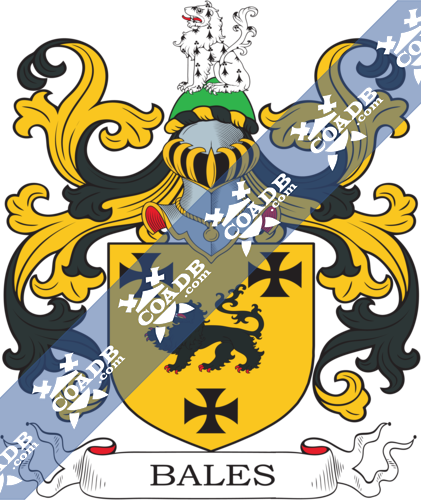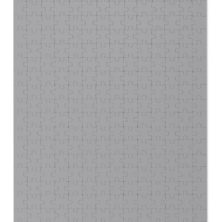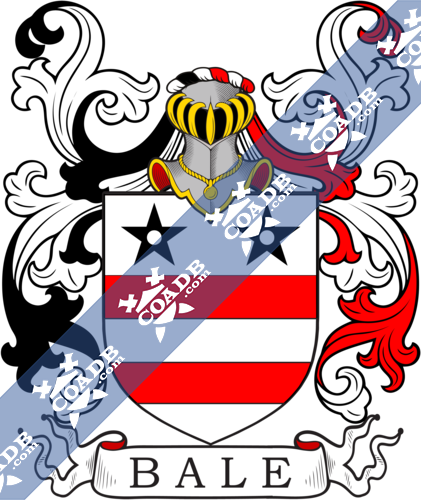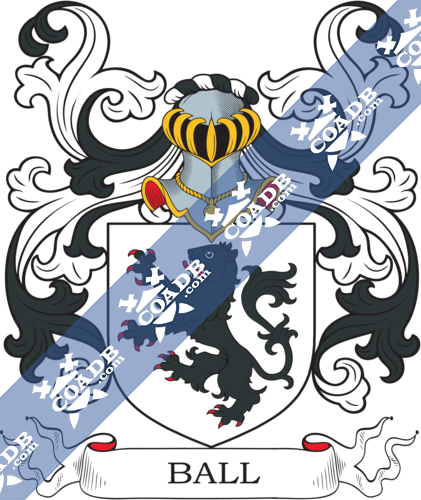Bales Family Crest, Coat of Arms and Name History
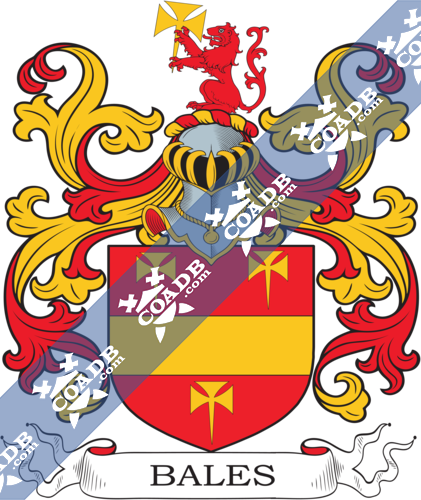
Bales Coat of Arms Gallery
Don’t know which Coat of Arms is yours?
We can do a genealogical research. Find out the exact history of your family!
Learn MoreBALES
Bales is a surname of ancient French origin introduced to the British Isles after the Norman conquest in 1066. The name can be translated from one of two meanings, both deriving their origin from a common source, the old French word “bail” which is the outer barricade around a castle. Used in this context, the name would have been topographical as it identified someone who lived near this structure. The surname is also thought to have come from the old French word “baile” or “bailey”. Used in this context the name is occupational as it identified a person assigned as a guard of the outer wall of the castle. In English, Bailey became an officer of a court, which meant they were both a guard, ensuring order and safety to the court, and someone who would deliver summons, and receive payments, and taxes.
Surnames, as can be noted from the information above, often were adapted from a person’s occupation or topographical landmark found near the individual’s home or birthplace, or possibly from the name of the village in which the person lived or was born. Surnames were sometimes patriarchal or matriarchal, created by combining the person’s given name plus the name of their father or mother. In some instances surnames were also created from defining physical traits; such as a person’s hair color, eye color, height, etcetera.
The use of surnames was a common practice in medieval France among the aristocracy, however, it was not until after the mid-sixteenth century that it became commonplace in across Europe. The small size of the settlements and villages which existed during the earlier periods across most of Europe often meant there was no need for surnames as everyone within these communities knew each other and a given name would usually suffice. However, as communities grew and people began to migrate on a larger scale, the Norman aristocracy’s penchant for using surnames was found to serve several practical purposes; it allowed people the ability to distinguish themselves, one from another, and it gave the government a reliable way to track people for tax, census, and immigration purposes.
Often times there existsed variations in spelling of many surnames found in records, as which date back to the early centuries. The variation in spelling of both given and surnames during this time period can be attributed to a lack of continuity regarding guidelines for spelling which was compounded by the diversity of languages in use in European countries at this time. The variations in the spelling of the surname including but not limited to; Bales; Bayles; Bails; Bailes; Baile; and Bale among others.
With the discovery of America and the addition of other outlying countries to the British Commonwealth such as; Canada, Australia, and New Zealand immigration began to occur on an unprecedented level. One of the first recorded immigrants to America bearing the surname or any variation of the spelling was Thomas Bales who arrived in 1635 and settled in Virginia. Henry Bales was one of the early settlers to Canada, landing and settling in Toronto in 1815. John Bales was one of the early settlers to Australia, landing and settling in Adelaide in 1851.
Worldwide, the highest concentration of people with the surname Bales are found in the United States, Australia, the United Kingdom, Canada, and France. By state, the largest percentile of those with the surname Bales live in Indiana, Kansas, Missouri, Oklahoma, Oregon, Tennessee, and Wyoming.
There are many people of note who bear the name Bales. American born Steve Bales was a NASA engineer and flight controller. He worked as a flight controller. He was responsible for determining the location of the spacecraft in space and monitoring the on board guidance systems. His first assignments were as backup controller for the Gemini 3 and Gemini 4 missions and flight controller on Gemini 10.
Bales is most renowned for his assignment as a guidance office during the Apollo 11 lunar landing. Several issues which arose during the mission which could have caused it to be aborted were overcome and corrected due to the expertise of Bales and his team of engineers. Due to his part in ensuring the success of the Apollo 11 mission Bales received the Presidential Medal of Freedom and he and his team received the NASA Group Achievement Award. During Bales long career at NASA, he eventually became Deputy Director of Operation at Johnson Space Center. He left NASA in 1996 taking a position at Amspec Chemical in New Jersey.
In the mid 17th century there was one Baronetcy created for a Bales family member. John Carleton Curlieu was made the Baronet Bale of Leicester, England in 1624. The title went extinct with his death in 1654.
BALES
Bales is a surname of ancient French origin introduced to the British Isles after the Norman conquest in 1066. The name can be translated from one of two meanings, both deriving their origin from a common source, the old French word “bail” which is the outer barricade around a castle. Used in this context, the name would have been topographical as it identified someone who lived near this structure. The surname is also thought to have come from the old French word “baile” or “bailey”. Used in this context the name is occupational as it identified a person assigned as a guard of the outer wall of the castle. In English, Bailey became an officer of a court, which meant they were both a guard, ensuring order and safety to the court, and someone who would deliver summons, and receive payments, and taxes.
Surnames, as can be noted from the information above, often were adapted from a person’s occupation or topographical landmark found near the individual’s home or birthplace, or possibly from the name of the village in which the person lived or was born. Surnames were sometimes patriarchal or matriarchal, created by combining the person’s given name plus the name of their father or mother. In some instances surnames were also created from defining physical traits; such as a person’s hair color, eye color, height, etcetera.
The use of surnames was a common practice in medieval France among the aristocracy, however, it was not until after the mid-sixteenth century that it became commonplace in across Europe. The small size of the settlements and villages which existed during the earlier periods across most of Europe often meant there was no need for surnames as everyone within these communities knew each other and a given name would usually suffice. However, as communities grew and people began to migrate on a larger scale, the Norman aristocracy’s penchant for using surnames was found to serve several practical purposes; it allowed people the ability to distinguish themselves, one from another, and it gave the government a reliable way to track people for tax, census, and immigration purposes.
Often times there existsed variations in spelling of many surnames found in records, as which date back to the early centuries. The variation in spelling of both given and surnames during this time period can be attributed to a lack of continuity regarding guidelines for spelling which was compounded by the diversity of languages in use in European countries at this time. The variations in the spelling of the surname including but not limited to; Bales; Bayles; Bails; Bailes; Baile; and Bale among others.
With the discovery of America and the addition of other outlying countries to the British Commonwealth such as; Canada, Australia, and New Zealand immigration began to occur on an unprecedented level. One of the first recorded immigrants to America bearing the surname or any variation of the spelling was Thomas Bales who arrived in 1635 and settled in Virginia. Henry Bales was one of the early settlers to Canada, landing and settling in Toronto in 1815. John Bales was one of the early settlers to Australia, landing and settling in Adelaide in 1851.
Worldwide, the highest concentration of people with the surname Bales are found in the United States, Australia, the United Kingdom, Canada, and France. By state, the largest percentile of those with the surname Bales live in Indiana, Kansas, Missouri, Oklahoma, Oregon, Tennessee, and Wyoming.
There are many people of note who bear the name Bales. American born Steve Bales was a NASA engineer and flight controller. He worked as a flight controller. He was responsible for determining the location of the spacecraft in space and monitoring the on board guidance systems. His first assignments were as backup controller for the Gemini 3 and Gemini 4 missions and flight controller on Gemini 10.
Bales is most renowned for his assignment as a guidance office during the Apollo 11 lunar landing. Several issues which arose during the mission which could have caused it to be aborted were overcome and corrected due to the expertise of Bales and his team of engineers. Due to his part in ensuring the success of the Apollo 11 mission Bales received the Presidential Medal of Freedom and he and his team received the NASA Group Achievement Award. During Bales long career at NASA, he eventually became Deputy Director of Operation at Johnson Space Center. He left NASA in 1996 taking a position at Amspec Chemical in New Jersey.
In the mid 17th century there was one Baronetcy created for a Bales family member. John Carleton Curlieu was made the Baronet Bale of Leicester, England in 1624. The title went extinct with his death in 1654.
Blazons & Genealogy Notes
1) (Norton, co. Northampton). Gu. a fesse betw. three crosses pattee fitchee or. Crest—A lion sejant gu. his paw resting on a cross pattee fitchee in the foot or.
2) (Wilby, co. Suffolk). Or, a lion pass. betw. three crosses formee sa. Crest—On a mount vert a lion sejant erm. Another Crest—A tiger’s head erased sa. armed or, gorged with a fess wavy ar.

